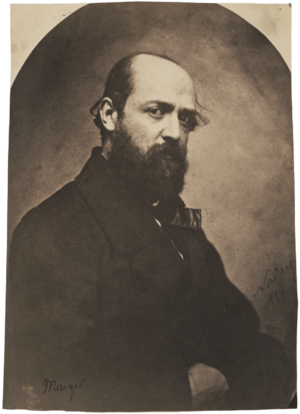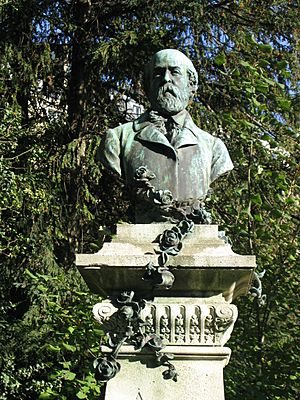Henri Murger facts for kids
Louis-Henri Murger, also known as Henri Murger (born March 27, 1822 – died January 28, 1861), was a French writer and poet. He is most famous for his book Scènes de la vie de bohème (Scenes of Bohemian Life). This book was based on his own life as a struggling writer in Paris. He lived in a small room at the top of a building. He was part of a group of poor friends who called themselves "the water drinkers." They were too poor to buy wine.
Murger's book mixes feelings of sadness, humor, and real-life experiences. It became the inspiration for many famous works. These include the 1896 opera La bohème by Puccini. It also inspired Leoncavallo's opera of the same name. Later, it led to the Broadway musical Rent in 1996. Murger also wrote poems and stories. One of his most famous poems is La Chanson de Musette.
Contents
Henri Murger's Life Story
Henri Murger was born and died in Paris, France. His father was an immigrant from Savoie who worked as a tailor and a building caretaker. Henri did not get much schooling. When he was 15, he left school and took many small jobs. He eventually found work in a lawyer's office. While working there, he also wrote poetry. A French writer named Victor-Joseph Étienne de Jouy noticed his talent.
De Jouy helped Murger get a job as a secretary to a Russian nobleman in Paris. Murger started his writing career around 1841. At first, he wrote poems and essays. But he needed money, so he wrote anything he could sell. He once said he wrote prose "at the rate of eighty francs an acre." This meant he wrote very quickly to earn a living. He even edited a fashion newspaper and a paper for hat makers.
His life began to improve when his friend, Champfleury, encouraged him to write stories. His first big success was Scènes de la vie de bohème. In 1851, Murger wrote a follow-up book called Scènes de la vie de jeunesse. He wrote several more books after that. But none of them became as popular as his first success.
Murger spent much of the next ten years living in a country house outside Paris. He often had money problems and was frequently sick. In 1859, he received the Légion d'honneur. This is a very special award in France. But within two years, he was almost broke and dying in a Paris hospital. Napoleon III's minister, Count Walewski, sent money to help him. But it was too late. Henri Murger died on January 28, 1861, when he was only 38 years old.
The French government paid for his funeral. Many important people from journalism, literature, and art attended. A newspaper called Le Figaro started a fund to build a monument for him. Many people gave money, and they quickly raised a lot.
Why His Name Was Spelled Differently
Early in his career, Henri Murger wanted to make his name sound more special. He signed his name as "Henry Mürger." The "y" looked English, and the umlaut (two dots) looked German. Both were unusual in French names. He tried other spellings too. In the end, he kept the "y" but dropped the umlaut. So, his most famous books were published under the name "Henry Murger."
Henri Murger's Books
- Scènes de la vie de bohème (1847–49)
- Scènes de la vie de jeunesse (1851)
- Le Pays latin (1851)
- Propos de ville et propos de théâtre (1853)
- Scènes de campagne (1854)
- Le Roman de toutes les femmes (1854)
- Ballades et Fantaisies (1854)
- Les Buveurs d'eau (1854)
- Le Dessous du panier (1855)
- Le Dernier rendez-vous (1856)
- Les Nuits d’hiver (1856)
- Les Vacances de Camille (1857)
- Le Sabot rouge (1860)
- Madame Olympe (1860)
In English translation
- The Bohemians of the Latin Quarter (1888)
- Winter Nights (1923)
See also
 In Spanish: Henri Murger para niños
In Spanish: Henri Murger para niños
 | Dorothy Vaughan |
 | Charles Henry Turner |
 | Hildrus Poindexter |
 | Henry Cecil McBay |



